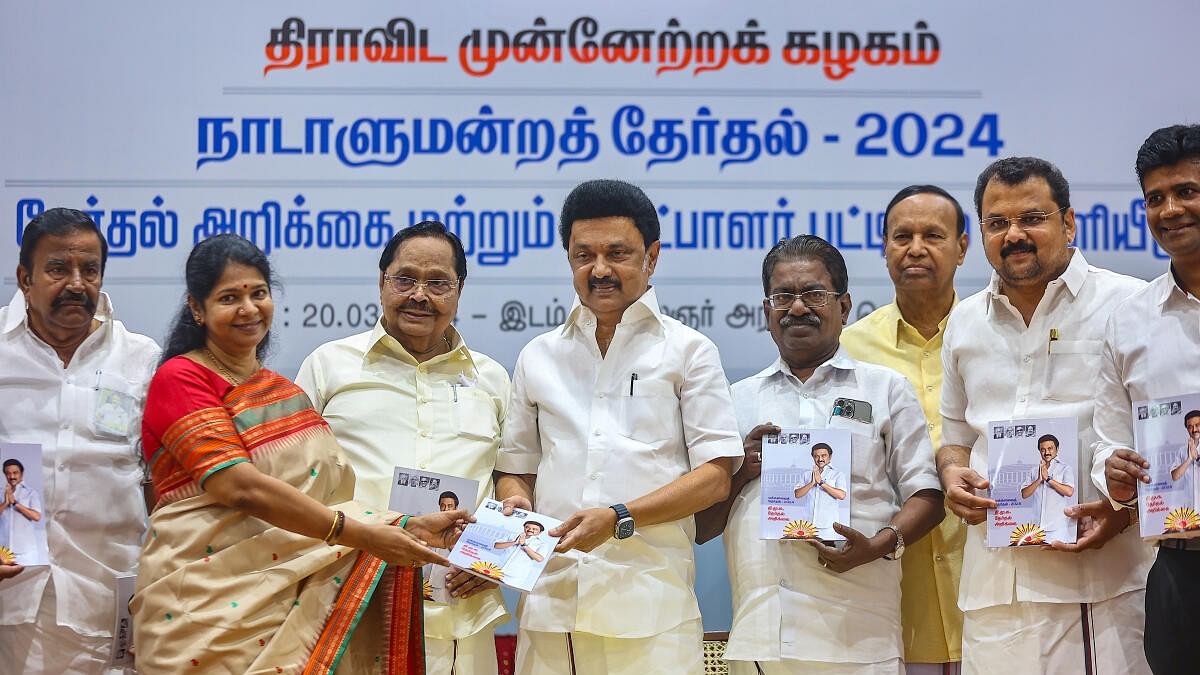
Tamil Nadu Chief Minister and Dravida Munnetra Kazhagam (DMK) chief M K Stalin with party leaders T R Baalu, Kanimozhi and others releases the party's candidates' list and manifesto during a party meeting, in Chennai, Wednesday, March 20, 2024.
Credit: PTI Photo
Chennai: Weaving its Lok Sabha manifesto around its pet issue of ensuring “true autonomy” to states, including clipping of powers vested with Governors, the Dravida Munnetra Kazhagam (DMK) on Wednesday promised to repeal the Citizenship (Amendment) Act, 2019 and junk the ‘One Nation, One Election’ proposal, piloted by the BJP, if voted to power.
Implementation of its flagship welfare schemes like free breakfast for primary school children, Rs 1,000 for women heads of families across the country, scrapping of toll booths on National Highways, junking the National Education Policy (NEP), and exemption from NEET for Tamil Nadu are some of the other key promises made in the manifesto.
Releasing the 68-page document at the DMK headquarters, party President M K Stalin expressed the fear that the BJP will do “anything to destroy” India’s “secular fabric and cooperative federal structure” if it came to power for a third consecutive term at the Centre. He accused the BJP of trying to weaken the states by reducing their share of revenue and decision-making and alleged that compliant states are treated conducive, while those “standing firm” for their rights are “targeted as enemies.”
“We (I.N.D.I.A. alliance) are sure to come to power at the Centre and that is why we have given these promises,” Stalin said, when asked whether these promises are made by DMK in its individual capacity or that of the I.N.D.I.A. bloc.
The manifesto focusses on “cooperative federalism” and “autonomy to states” as the DMK continues to fight running battles with Tamil Nadu Governor R N Ravi. The DMK dispensation has knocked at the doors of the Supreme Court, for the second time in six months, this time to overturn the Governor’s decision not to appoint as minister an MLA, who was reinstated after his conviction in a corruption case was stayed by the Supreme Court.
Stalin said the new government will undertake actions to appoint Governors with the consultation of state Chief Ministers and move towardsremoving Section 361 of the Indian Constitution that gives Governorsa special exemption, thereby ensuring that they are also subject to legalactions.
The DMK also promised legal amendments to ensure state governments appoint Vice-Chancellors to universities, rather than Governors. Formation of State Development Council, re-establishing the Planning Commission, a permanent Finance Commission, scrapping of the Agnipath scheme, granting of Indian citizenship to Sri Lankan Tamils who have made the country their home, and granting of statehood to neighbouring Puducherry, currently a Union Territory, are other key promises.
The party also said the introduction of the Uniform Civil Code will be prevented to preserve the secular nature of India and ensure that the delimitation exercise is conducted based on the 1971 population.
Maintaining its long-held stand, the DMK insisted on the removal of Article 356, which allows the dissolution of duly elected state governments by President’s rule and promised to establish a bench of the Supreme Court in Chennai. It also promised a mandatory cooling-off period of 2 years will be introduced for retired judges and secretaries before joining private companies or political parties.
Other key promises are making Tamil as the official language, Tamil as a co-official language in union government offices in Tamil Nadu, establishment of Tamil departments in all universities across India, and equal funding for all state languages, including Tamil.
Implementation of the Sethusamudram Project, a separate Budget for Railways, immediate implementation of 33 per cent reservation for women in Parliament, waiving off loans and interests for farmers in nationalised and scheduled banks, waiver of educational loans for students, regulating the air fare, are some of the other promises.
The party gave a slew of other promises with the manifesto focussing on sectors like defence, child welfare, women development, and minority welfare among others. The manifesto also focussed on other sectors and promised specific schemes and projects for every district of Tamil Nadu.